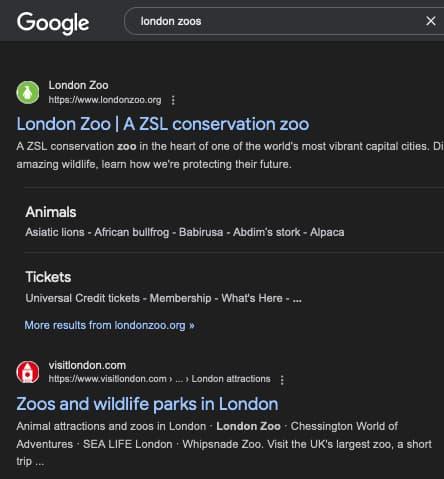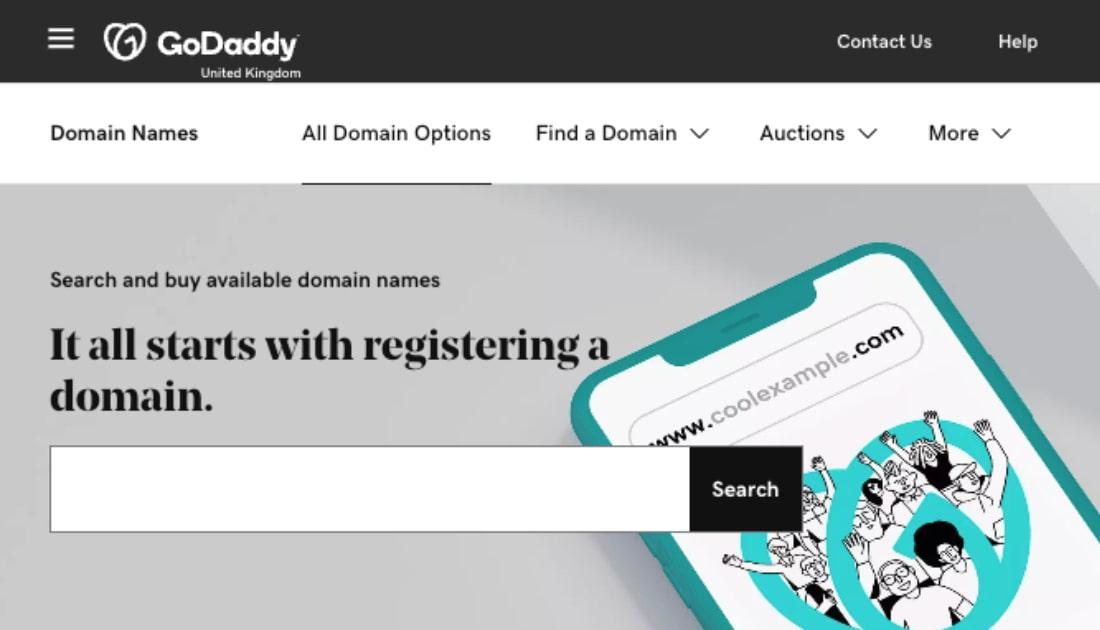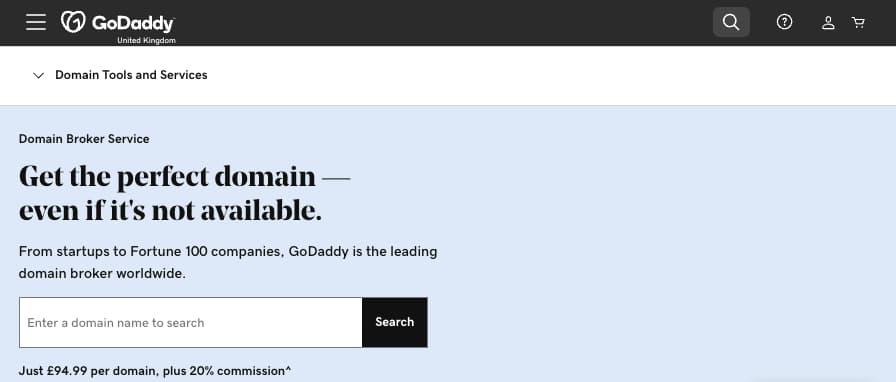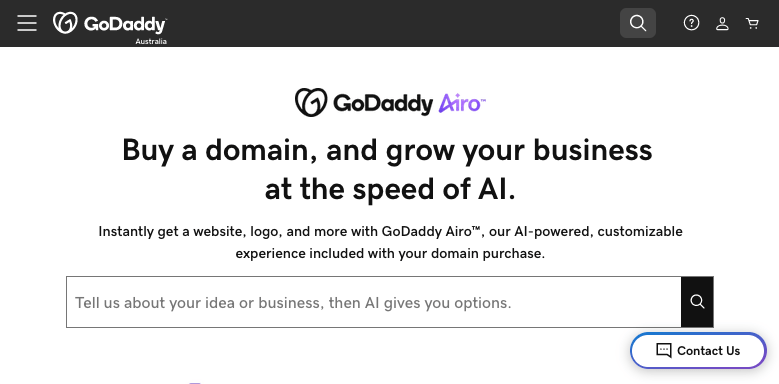Nowadays, it’s rare to find a business without a website — or at least some online presence. You probably know that to have a website, you need a domain name. But what are the rules for registering a domain name in the UK? Can anyone get one?
It can be confusing at first, with all the domain name jargon and strict governance around domains.
This article will tackle your questions regarding registering domain names in the United Kingdom.
Editor's note: GoDaddy Airo uses AI to help you find the perfect domain name then serves up a logo, website, social media handles and more. All for the price of your domain name.* Try it now! TechRadar Pro calls Airo a "game-changer for small businesses."
What is a domain name? Is it the same thing as a website?
Many people think a domain name is the same thing as a website. The two things are, however, slightly different.
A domain name is the website’s online address and appears within the Universal Resource Locator (URL) for any given website. This is what is typically shared by a business when asked how they can be found online.

For example, amazon.co.uk is the domain name of the popular website, while the URL is https://www.amazon.co.uk.
Domain names are unique — only one entity or person can use a particular domain at a time.
Most domain names purchased for business use include the business name, as in the BBC example.
A website is a collection of digital files stored on a server. These files can be accessed by typing the related domain name into a browser.
You may also like: What is a website - definition with examples
Should my domain name and business name match?
The main difference between a business and a domain name is that:
- A business name is used for branding and legal identification purposes.
- A domain name is a digital website address.
It’s always a good idea to have the domain name match the business name — if for no other reason than it cuts down on confusion.
But it doesn’t need to be the same in order to have your own website.
A business might have a web address that is different from its business name because:
- The domain name that matches their business name is registered to someone else.
- The business is a subsidiary of a parent company with a different name.
For example, Alphabet is Google’s parent company. But Google uses google.com for its website address.
Or sometimes, a business will register a special domain name as part of a marketing campaign, such as boxingdaysale.co.uk.
Because anyone — including your competitors or members of the public — can easily purchase domain names, it’s strongly recommended to get a domain name that contains your company name.
You should also register the same domain name in several relevant extensions (.e.g. .co.uk and .com).
You can always redirect any additional domain names to your primary domain name.
The benefits of registering more than one domain
By buying related or common misspellings of your primary domain name, you keep others from registering and using them to pull traffic away from your website.
Have a product or service that you want to promote more than others?
It might be worth giving it some TLC and registering its own domain name.
For example, eCommerce giant Amazon does that with Kindle. The domain kindle.store redirects to the Kindle product page on Amazon’s home website.
This is a savvy strategy, designed to capture all those people who are typing “buy kindle” into their web browsers.
You may also like: How much does a domain name cost and why?
Can you use a language other than English for domains?
Yes. These are called Internationalised Domain Names (IDNs) and they are displayed in their native language script or alphabet — for example, the Arabic alphabet or a non-alphabetic writing system such as Chinese characters.
An IDN is a good choice for any website aimed at a population that speaks a language other than English.
The importance of choosing the right domain name
Just like picking the right name for your baby, pet or business, choosing the right domain name for your website is essential. After all, if your business succeeds, you’ll be sharing this name — on the phone, in face-to-face conversations — for years to come.
- A good domain name will speak to what people want and stick in their heads.
- An unsuitable domain name, or one that infringes on someone else’s copyright, can damage your business and turn off prospective customers.
- An easy-to-remember domain name can help your customers recognise your product or make a connection between your business name and your products.
Another tip when picking a domain name is to avoid hyphens and numbers. No one remembers to put hyphens correctly. With numbers, they can be numerical or spelt out, which can be confusing.
The last thing you want is to confuse potential customers.
Which brings us back to the question of whether your domain name should match your business name. From a branding standpoint, this is a good idea.
It’s tempting to be clever with domain names, but clarity trumps everything. So you'd be wise to stay on brand as much as possible.
When your customers think of your business, you want them to remember your web address instantly. Don’t make them think too hard.
The right domain name may boost your search rankings
A bonus benefit of picking the right domain name is that it can be good for your search rankings.

Search engines like Google look for keywords to decide what each page of your website is about. The words on your website provide search engines with an idea about what your business does.
Why does Google do this? Because they want to serve up the web content that most closely matches the searcher’s query.
Savvy business owners research the keywords that people are typing into their browsers when looking for their products or services, then weave those words into the text on each page.
Including a keyword in your domain name could give you an advantage in being found.
An example of this is cheshiredriveways.co.uk
This domain name has the advantage of containing a popular keyword (driveways) and a service location. If you lived in Cheshire and needed a new driveway, those are the very words you would likely type in to Google for help.
Search engines rely on keywords in deciding which websites to rank near the top of the search results page. And the top of the page is where you want your business to appear, as the top three get 54% of clicks.
The three types of domain name extensions
In addition to deciding what comes before the dot in your domain name, you’ll also need to decide which domain extension to put after the dot.
Here are the three broad categories of domain extensions:
Original Top-Level Domains (TLDs)
These domain extensions are the highest in the Domain Name System (DNS) hierarchy and have been around the longest. Some examples of
TLDs include:
- .com: short for commercial, .com is still the most popular domain extension in the world.
- net: short for network, this extension is often used by internet service providers (ISPs).
- org: short for organisation, .org is linked to charities, wikis or not-for-profit groups.
While the three extensions above are the most common, did you know there are over 1,000 possible TLDs? See the whole list here.
Country code Top-Level Domains (ccTLD)
Two-letter domains have been assigned to each country in the world. For example, China has .cn. Tuvalu has .tv.
The UK’s ccTLD is .uk, in addition to .co.uk.
The intention of ccTLDs is to be used by the country’s residents. Some countries, such as Colombia (.co) and Montenegro (.me), have let residents outside register domain names using their country code.
Generic Top-Level Domains (gTLD)

Generic top-level domains serve as a category in top-level domains. There are hundreds of gTLDs in use, including:
Some of these domains are restricted for use by certain individuals and groups (e.g. .gov and .edu), while others can be registered by anyone. You can scroll through the complete list here.
The .co.uk domain name extension is a must-have for any UK business.
Although the shorter .uk domain extension is now available, .co.uk is still the most familiar. As a result, Brits will assume it is at the end of any business web address.
So, why not make it easy for them to find you?
How can I buy a domain name in the UK?
As mentioned earlier, every country has its own, unique ccTLD. The country code domains for the UK are co.uk and .uk.
While they are designed to signify that you are based in the UK, they can actually be purchased by anyone.
Other options that include ‘uk’ are .me.uk and .org.uk.
GoDaddy is a leading registrar authorised to sell domain names in the UK. This means GoDaddy is authorised to provide services to business owners who want to:
- Register a new .co.uk or .uk domain name
- Renew an existing .co.uk or .uk domain name
- Make changes to their .co.uk or .uk domain name record (DNS)
GoDaddy can help you easily transfer your domain from other registrars to GoDaddy. This will allow you to handle all the aspects of your business from just one place.
Find the perfect domain name now:
How much does it cost to register a domain name in the UK?
Like houses, domain names vary in price. You can expect to pay between £0.01 and £12.99 per year for a typial .co.uk or .uk domain, depending on a variety of factors.
Premium domain names — those that are more valuable because of length, domain extension or domain authority — can cost much more.
What if the domain I want is taken?
If the .co.uk or .uk domain name you want has already been registered, don’t fret. You can check the domain owner's details using our WHOIS tool and then ask if they're open to selling their domain name.
Depending on your business structure and location, you may consider other UK domain extensions such as:
- .org.uk: Intended for non-profit organizations.
- .me.uk Intended for private individuals.
- .london is commonly used for businesses located in or around the capital.
Currently, the most popular domain extensions in the UK are .com and .co.uk.
Since .uk is newer, it won’t take long to catch up, as it’s a shorter URL.
When it comes to domain names, shorter is often better and more valuable.
Read more about domain names, including what to do if the domain you want is taken and when to opt for .com, in this post.
Can you make money buying and selling domain names?
Is domain investing worth it — and is it legal in the UK? Can I sell a domain name?
The good news is, yes, you can sell domain names.
If you do it right, you can even make a profit.

Domain names can be bought, traded and sold much like real estate — only that it’s all on the web.
There is a massive demand for good, brandable custom domain names. All you need to do is:
- Think of them
- Register them if available
- Nurture them so their value increases
In fact, trading domain names has become a multi-million-dollar industry. Since domain names are affordable and easy to buy (even in bulk), entrepreneurs look to cash in on great domain names to own and resell.
SEO professionals use various metrics to assess the value of any domain. The most reliable metric is the Domain Authority.
Editor's note: Want to have a general idea of the resale value of any domain name? Type it into this free appraisal tool.
Where can I buy and sell domain names?
There are many marketplaces, such as GoDaddy Auctions, where you can post your domains for sale. You can either set a fixed price, auction it, or allow people to make an offer.
- Set price: Setting a specific fee is the preferred method for domain sellers with an extensive portfolio of domains who aren’t rushing to sell them.
- Auction: This is a good place to sell higher-profile domain names where there is a lot of interest, since auctions can result in the highest possible price.
- Make an offer: Make an offer sales are well-suited for niche domains and industries that are more specialised.
Frequently Asked Questions
Still have questions? The answers may be here.
Which domain provider is best in the UK?
More people trust GoDaddy with their domain name registration than any other domain registrar on earth.
GoDaddy is the world's largest domain registrar, with more than 84 million registered domain names under its management.
It serves thousands of Brits and their businesses, providing free 24/7 support via phone, text or chat.
More than 100,800 consumer reviewers on TrustPilot give GoDaddy an average of 4.7 out of 5 stars.
How do I get a domain name in the UK?
You can register a domain name in the UK through a domain name registrar like GoDaddy.
How do I check if a domain name is available in the UK?
Domain name registrars like GoDaddy make it easy to search for domain names — even if you have never done it before.
All you do is type your business name or words related to your venture into the search box and GoDaddy does the rest.
If you have your heart set on a particular domain name but it has already been registered by someone else, GoDaddy’s automated search tool will suggest similar domain names for you to choose from.
If you are determined to get a domain name that is already taken, GoDaddy offers a Domain Broker Service staffed by agents who can negotiate on your behalf to buy the domain name from its current owner if possible.
What is a domain name?
A domain name is the web address that people type in when they want to visit a particular website.
For example, let's say you want to buy some cheap dog biscuits for your pet. You might type discountdragon.co.uk into your web browser. This is a domain name.
Every domain name has several components, including a Top-Level Domain (TLD), which is everything that follows the final dot of a domain name. A few examples of TLDs are .com and .net.
In the domain name discountdragon.co.uk, the TLD is .co.uk.
While .com is the most popular TLD in the world, there are many others to choose from. They include .org for organisations (typically charities and not-for-profits), .gov for government agencies and .edu for educational institutions.
While .org is open for registration by anyone, the last two TLDs are restricted for use by those types of organisations.
Over the last 10 years, a raft of new TLDs have been rolling out.
These range from the professional (.law, .actor, .plumbing) to the culinary (.pizza, .wine) as well as location-specific TLDs (.london).
Every country has its own country-code TLD — such as .cn for China and co.uk or .uk for the United Kingdom. This is why many of the domain names of UK businesses end with .co.uk or .uk.
What is the most popular domain name in the UK?
The most-visited domain name by Brits varies from month to month. In September 2024, google.com received 4.09 billion visitors from search results. Of UK domain names, bbc.co.uk was the most popular with 554 million visitors.
The most popular TLD in the world is .com, which is used by 44% of websites globally. Likewise in the UK, .co.uk is the most popular with UK websites. If your website caters primarily to Brits, or if the .com you want isn’t available, .uk is an excellent option.
How do I transfer a .uk domain name to a different registrar?
You can transfer your domain name to any accredited registrar.
To transfer a .uk domain name to a different registrar, contact your proposed new registrar to request a "change of registrar of record." You will be asked to provide a valid transfer authorisation code.
To get your transfer authorisation code you can request it from your current registrar. It will send the transfer authorisation code to the registrant email address listed in the registry (presumably yours).
What are the requirements for registering a .org.uk domain name?
Domain names ending with the .org.uk domain were originally intended for charities and non profits, but restrictions have been relaxed.
How much does it cost to register a .uk domain name?
You can expect to pay between £ 0.01 and £12.99 per year for a .co.uk or .uk domain. Check this link for today’s prices.
What is the process for transferring a UK domain name to a new owner?
To transfer an UK domain name, you must be eligible to own the name, as so must the person you are transferring it to.
You can initiate a transfer, known as "change of registrant," via your registrar's website. Note that you'll need to provide your domain's authorisation code to approve the transfer. You may also need to pay a Registrant Name Change fee.
Any remaining time on your domain registration period does not transfer to the new registrant. They will need to enter into a new licence agreement and pay the applicable fee.
*Premium features like business email and e-commerce available for an added cost.









